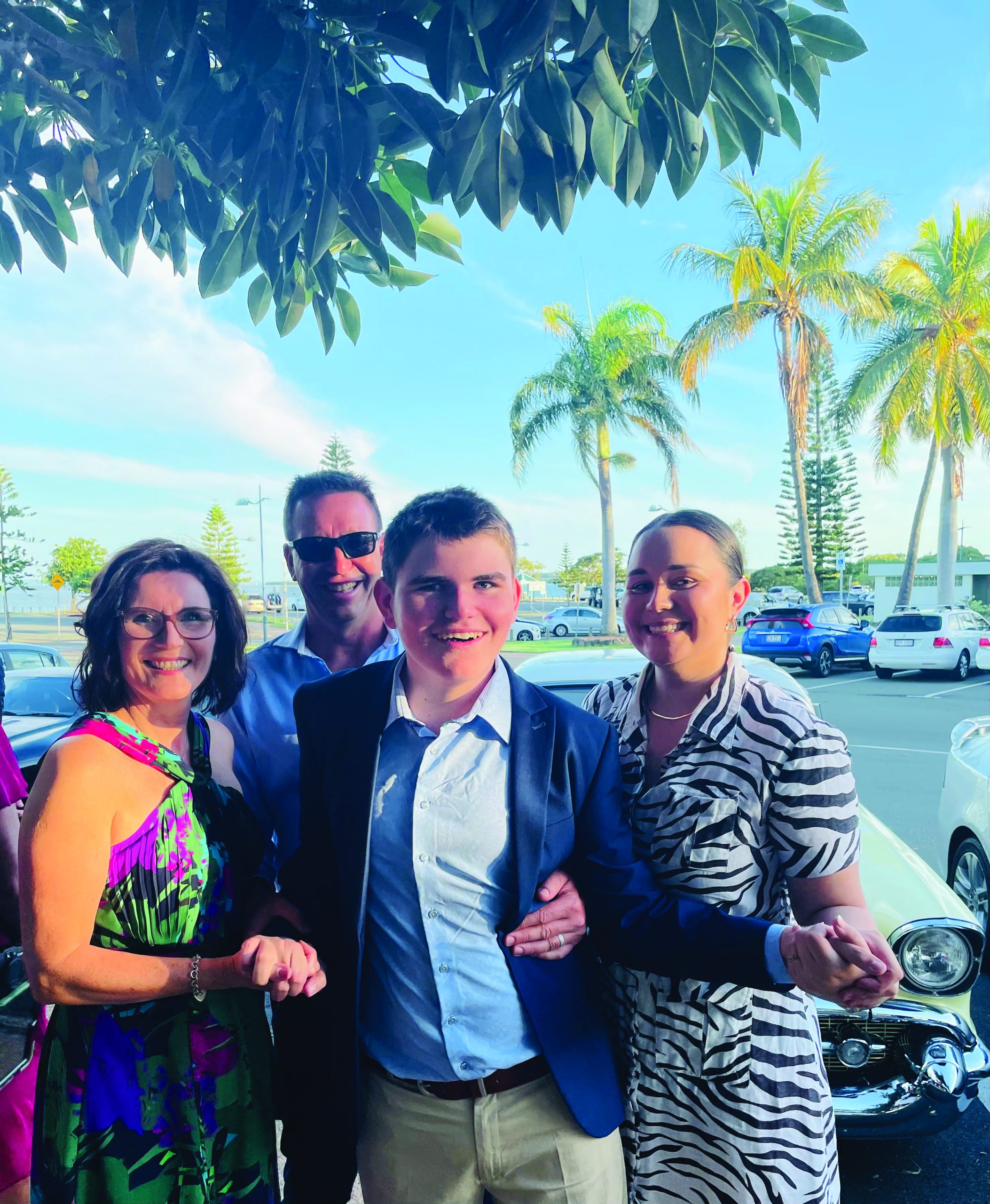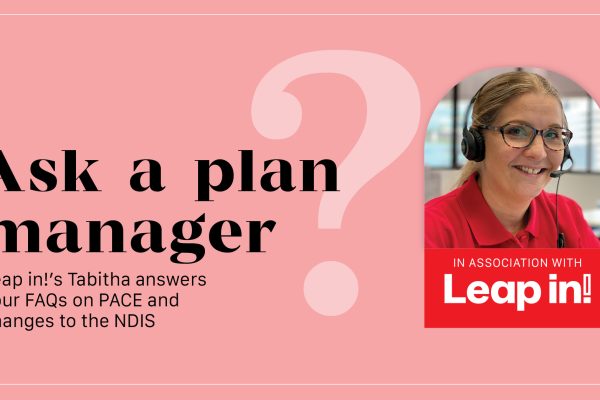
School’s out: now what?
By Fiona Lawton
School’s Out: Now What?
As her son got older, reality set in for Fiona Lawton – it was time to make a “purposeful plan” for life after school.
There are a few questions that can strike fear into the heart of a Special Needs Parent and one of the worst is, “So what are your plans for when they finish school?”
“No idea! I’ll cross that bridge when I get to it,” was my oft and flippant reply while my son was at school. That is, until he turned 15.
We were busy navigating puberty and growth spurts and the question started coming with an annoying frequency. Friends, family, therapists and teachers were expecting a well-considered answer – and we had none.
You can be mistaken in thinking that post-school transition starts when the young person finishes school, but reality is, all young people need to start to contemplate their post-school pathways in Year 10. This might include making subject selections for senior years to ensure they get into the university course of their choice, considering vocational training pathways, job options, or even toying with the idea of a gap year.
My son has a rare neurological condition called Angelman syndrome with severe intellectual disability and is a non-speaker. He had attended a special school for all his education, and we knew that there were limited options with mainstream services for post-school employment or tertiary study.
That didn’t mean we didn’t have to plan for his future – in fact, it meant that we needed to get creative.
Finishing school was going to be a huge transition for him, given his sense of community and connection over 13 years of school, and the safe and controlled environment that he was familiar with. Plus, he had attended the same afterschool care and vacation care programs for years – everyone understood him, could communicate with him, and loved him. And that was all going to end abruptly when school finished.
Research shows that people with intellectual disabilities can experience severe anxiety and depression if a change is not managed well. Our son needed to belong to a community that was outside of his school connections. He needed to make friendships and have regular activities that would see him through into adulthood – just as his siblings had done by being members of the local sports and dance clubs.
Many of the questions we found ourselves asking where the same that we had asked his brother and sister – what were his interests, where was he going to live, how was he going to support himself, and who was going to help him?
And so began our 5-step “Post-School Project”.

Step 1 – START PLANNING
Plan to be available to help your loved one transition – whether it be through leave from work, going part-time for a period, change of career, or reallocation of time.
While a change of career or work schedule may not be possible for everyone, taking some leave or increasing family and/or funded support may help smooth the transition for you all.
We knew that our son was going to stay living at home with us, and that we needed to be available for him emotionally and physically through the post-school transition.
My husband had some long service leave owing, so he applied for it three years out to ensure it was locked in! The plan was that he would be there to support our son for the first few months after he left school.
I was going to keep working full-time, but in Year 11 when COVID-19 first hit, I was presented with the opportunity for redundancy. While it hadn’t been part of our original plan, I jumped at it and finished working in my government job early in our son’s final year. This was perfect timing as the post-school transition actually starts at the beginning of Year 12, and I was available to help chart the course.
Step 2 – ADJUST YOUR TRANSITION TIMETABLE TO WORK FOR YOU AND YOUR FAMILY
If your loved one is thriving at school and well-connected with friends, then plan for them to all transition together.
If your loved one is not yet ready to leave school due to emotional preparedness, lack of available post-school options, family needs, or skill development, work with the school principal to explore if they can repeat a year.
However, if they are ready to leave school, then start a purposeful transition in collaboration with outside services and school, with the aim to gradually reduce school-based activities and attendance.
In Year 10, we connected with two disability services that supported teenagers and young adults in the home and with social and community access. We were looking for a “hub” – a place where our emerging young adult could hang out, be with friends and do fun things while developing skills and independence.
He started attending on weekends, and this gradually increased in Year 12 to a few days per week. By the end of Year 12, he was attending school two days a week and was doing a range of activities including sailing and gym, and life skills training on the other days.
Step 3 – PREPARE A TAPESTRY OF OPTIONS
While school is a “one stop shop” of services, life in the post-school adult world does not necessarily need to look the same. It’s worthwhile to do some “Good Life Planning” to help identify the passions, interests, likes/dislikes and meaningful relationships that are important for your loved one.
In Year 12, we did a Good Life Planning session for our son as a family. It highlighted his need to feel a sense of belonging and community, his love of live music and musical theatre, a desire to continue to learn, and the critical need for ongoing age-appropriate connection with his peers.
No one service could offer all that we were looking for, so we connected with a range of providers to create a rich and varied program – one where his school cohort was going so he could maintain relationships and friendships; another where he had a dedicated support worker to help him with physical therapy and to continue to develop his communication and daily life skills; and yet another provider who focussed on social connection and community access in key interest areas such as sailing, musical theatre classes, and outings with friends.
Step 4 – PLAN REASSESSMENT
Not everyone receives NDIS support, but if your loved one does, then it is likely you will need to submit for a NDIS Plan Re-assessment due to Change of Situation with Post-School Transition. The timing of this will depend on the plan end date, how the funding is tracking and what your plans are. Consider submitting midway through Year 12.
You may need to consider housing – is your loved one staying home or moving out into Supported Independent Living? Will they need Special Disability Accommodation? Or are Independent Living Options something to consider?
If they are looking for a job, applying for School Leaver Employment Support (SLES) funding is imperative in the last year of school or first year out. It is typically funded for two years and for NDIS participants up to the age of 22.
Will they be undertaking study? Tertiary study providers have Disability Inclusion Officers who will do an AccessAbility assessment to see what study support they need – and what can and cannot be provided. Being aware of mainstream services and supports is really important. The NDIS cannot, and will not, provide for everything.
Finally, what are the self-care and daily needs of your loved ones, and what informal supports are going to be able to assist moving forward? What is age-appropriate to provide and how are “Choice” and “Control” and social inclusion embedded into the everyday?
Answering these questions will help you identify what needs to be funded by the NDIS and other services.
Step 5 – PARTICIPATE IN RITES OF PASSAGE
We all have rites of passage into adulthood, and it is just as important for our loved ones to celebrate their achievements and experience the pure joy of being in the limelight – special dresses and suits, attending formals, limousine rides, graduation ceremonies, photos and parties. And… Schoolies!
Oh the joy! By far the best part of our transition were all the celebrations, moments of pause and reflection, and the big graduation – I still smile thinking about it. Our son’s formal, with the photos by the bay, the convoy of limousines and fancy cars, and the awards ceremony is a night I will never forget.
He certainly knew there was something special happening, and he grew in stature, confidence and pride with every step. From the suit fitting and shoe shopping to the “Guard of Honour” at the final assembly, our son’s face conveyed the pure delight of this most important rite of passage.
His year level even spent a week celebrating Schoolies with day outings and fun activities – honouring their achievement, their friendships, and the start of a new era.
I know I secretly smiled at the end too – no more darn Book Week fancy dress, sports carnivals, juggling therapy and medical appointments with school commitments and trying to remember if it is an Individual “Learning/Education/Curriculum” Plan!
We had done it!
Fiona Lawton is National President of the Angelman Syndrome Association Australia and owner and director of Neu Pathways Australia. neupathwaysaustralia.com






